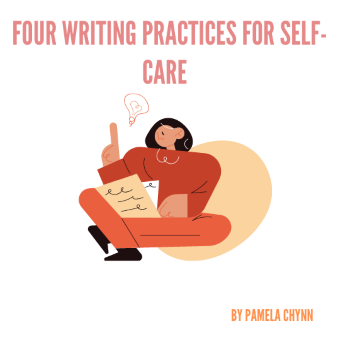For several years, I have struggled with clinical depression. Creative writing has been as inviting as a hot bowl of my favourite vegan chicken noodle soup when suffering through the common cold. My creative writing practices have often nourished and comforted me back to a healthier state of mind.
Four writing practices that I frequently engage in because I have found them to be the most beneficial for my mental health are as follows:
1.Journal writing
This can be quite cathartic. You can let loose the Pandora’s box of emotions stored within you whether it be anger, sadness, disappointment, frustration or joy.
Pick any time of day that you feel you are most likely to have time to relax, even if it is only for a few moments. Try and write in your journal consistently at that time of day. Have something close by that gives you comfort for moments when this practice can feel emotionally triggering. This can be a cup of tea or a favourite blanket that you can wrap around you – whatever makes you feel comforted.
2. Gratitude Diary
I started doing this practice during the pandemic. I have found that writing a list of things that I am grateful for has helped immensely to assuage my frustrations. By refocusing my perspective from a more positive direction through this daily practice it has enabled me to better look at things from the bright side.
The steps involved in the process of gratitude journaling are as follows:
Keep a notebook for your gratitude journal. Nothing, absolutely nothing, is entered in this journal but your daily gratitudes and affirmations.
The most optimal time to do gratitude journaling is first thing in the morning. This will help you to jumpstart your day from a more positive perspective that hopefully you can build on as you mentally treasure hunt for other things throughout your day to be grateful for.
For each entry write three things for which you are grateful. It can be anything, even something as simple as your coffee that morning was exceptionally good.
Optional, but highly recommended: after listing three things for which you are grateful, write a positive affirmation about yourself beginning with the words “I am"
3. Wish Diary
While counting your blessings can be great for your mental health so too can envisioning a happier, more fortunate future on many different levels. Keeping a Wish Diary can sometimes assuage this setbacks and frustrations when striving towards your goals and fortify your mental strength to help keep you on track to achieving your dreams.
As with the gratitude journal, this is also best done first thing in the morning.
Write a list of three fantasy visions you have for the future. This can be anything from obtaining enough money for something you fantasize about having, taking a dream vacation, to levelling up to your next goal as a writer. For each vision you can write anywhere ranging from a few sentences to a few paragraphs (depending on your schedule or inclination) The benefits of writing a wish journal I feel is best summarized in the words of Albert Einstein who once stated, “Somethings have to be first imagined before they can become real.”
4. Free Writing
Freewriting is basically letting loose, freestyling with whatever thoughts are inspired by the prompt you are given or choose.
You can google and download free writing prompts from the internet. There is literally an endless cornucopia of free writing prompts to be found on the internet.
How to do a free write:
Pick a prompt.
Set a timer (can be one on a smart phone or other timers such as cooking timer) for whatever amount of time you feel like doing this writing exercise.
Once the timer begins, start writing and don't stop until the timer ends. Write down whatever thoughts come to you.
Do not stop writing and don't edit yourself. Just let whatever thoughts you have at that moment come freely pouring out onto the page.
One of the most therapeutic aspects of free writing is that it encourages you to take a Zen like exclusive focus on whatever spontaneous thoughts or feelings arise based on the writing prompt.
Whichever writing practice you choose remember that whatever thoughts and feelings you express, they are your own thoughts and feelings. You have right to own them. Each one of them whether positive or negative had some reason for their existence and therefore both ends of the mental and emotional spectrum deserve to be respected.
Writing down your thoughts and feelings is one of the best methods to affirm your ownership over your thoughts and feelings. This kind of confidence that creative writing brings is a great step on the journey to recovering from and/or your making peace with your mental illness. That kind of confidence is definitely as nourishing for your mental health as a bowl of your favorite soup is for your body.
Pamela Chynn

